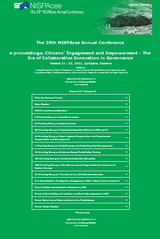NISPAcee Best Graduate Student Paper Award
The purpose of the Best Graduate Student Paper Award competition is to recognise a graduate student who demonstrates the ability to produce a high quality research paper presented during the NISPAcee Annual Conference.
2. Description of the Award
The award for the Best Graduate Student Paper was first announced in 2005, during the 13th NISPAcee Annual Conference. The winner is presented with a certificate and the paper is published in a NISPAcee publication.
3. Eligibility Criteria
In order to be eligible for the competition, a conference participant should meet the following criteria:
• be enrolled in a graduate or postgraduate degree programme,
• be from the NISPAcee region; the paper should also be focused on the NISPAcee region,
• the paper abstract must be accepted by one of the annual NISPAcee conference’s working groups or working sessions,
• be registered for the NISPAcee conference,
• present the accepted paper at the NISPAcee conference,
• submit the full paper prior to the NISPAcee conference within the official conference deadline for submission of full papers.
4. Submission Process
In order to participate in the competition, a student must indicate her/his interest in the application, with a paper proposal for the upcoming NISPAcee conference and complete in the NISPAcee database and application module, the following data:
1. First and last name.
5. CV.
6. In addition, the applicant must submit to the NISPAcee Headquarters, confirmation regarding her/his study, issued by the relevant university. The letter should also include an e-mail address and phone number for the academic adviser or department head.
The deadline for submitting the application is the same as the official deadline for the submission of papers for the conference. The paper should be uploaded to the NISPAcee website as a regular conference paper; members of the Selection Committee will identify it based on the application.
5. Award Committee
The NISPAcee Steering Committee appoints members and a Chairperson for the Best Graduate Student Paper Award Selection Committee.
6. Criteria for Selection
In selecting the best graduate student paper, the Selection Committee members will use the following criteria:
• the paper addresses an important public sector issue;
• good research design;
• quality and significance of the research;
• high-quality data collection methods and analysis where appropriate;
• originality, clarity and sophistication of argument;
• overall professional organisation of the paper (style, footnotes, bibliography).
The Selection Committee, at its discretion, may establish other criteria.
7. Announcement of Award
 Steven Nõmmik, Tallinn University of Technology, Estonia for his paper:
Cross-organisational collaboration management of digital innovation in
the public sector – the case of the Estonian Employment Register
Steven Nõmmik, Tallinn University of Technology, Estonia for his paper:
Cross-organisational collaboration management of digital innovation in
the public sector – the case of the Estonian Employment Register  Ms. Alexandra Columban, Babes-Bolyai University, Department of Public Administration and Management, Romania
Ms. Alexandra Columban, Babes-Bolyai University, Department of Public Administration and Management, RomaniaPaper: From Silent Witness to Vocal Advocate. The Role of Civil Society Organisations in Promoting Gender Equality and Combatting Violence Against Women and Girls in Post-2010 Romania

Paper: The Development Regions of Romania and Local Revenue Collection Levels between 2008 and 2011
AWARD 2017
 Ms. Evgeniia Kutergina, Higher School of Economics, St. Petersburg, Russian Federation
Ms. Evgeniia Kutergina, Higher School of Economics, St. Petersburg, Russian Federation Ms. Urša Jeretina, Faculty of Administration, University of Ljubljana, Ljubljana, Slovenia
Ms. Urša Jeretina, Faculty of Administration, University of Ljubljana, Ljubljana, SloveniaPaper: Administrative Aspect of Consumer Alternative Dispute Resolution in the EU, Slovenia and Croatia
Mr. Tarmo Puolokainen and Mrs. Annika Jaansoo, PhD students at Faculty of Economics and Business Administration, University of Tartu, Tartu, Estonia
Paper „Possibilities of providing public services threough outsourcing in small peripheral areas: The case of Estonian Rescue Services".
Paper: Chinese Loans for Infrastructure Projects in Developing Countries: The Connection between Short-Term Payoffs to the Chinese Local Governments and Long-Term Obligations of the Belarusian Nation
Paper: The Influence of the Global Economic Crisis on Regional Differences in Romania
AWARD 2009
Paper: Building a Metropolitan Area Model for the Romanian Administrative Space
Paper: Development priorities in an emerging decentralized economy: The case of Armenia local development programs
Paper: Minister’s advisors interfacing at the "summit”: The case of Estonia
Ms. Maria Keris, PhD student at the Tallin University, Estonia
Paper: The role patterns of minister’s personal advisors in politico-administrative dichotomy. Comparative case study of two Estonian ministries.
Ms. Krisztina Toth, PhD student at the University of Fribourg, Switzerland
Paper: The Impact of Legislature and Citizens on the Budgeting Process in Switzerland: Lessons for Central and Eastern Europe




 Price:
Price: 









